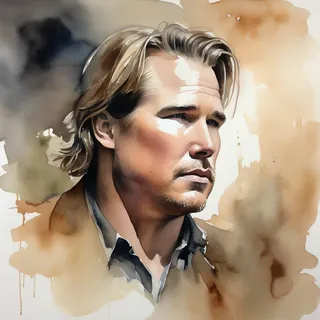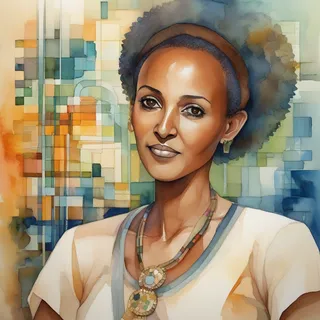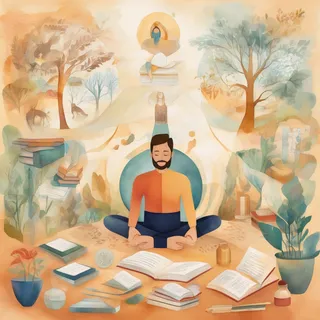If I could sit down with my 25-year-old self over coffee, I'd probably start with "relax, you're going to be okay." Then I'd spend the next three hours frantically trying to download two decades of hard-earned wisdom before the timeline paradox kicked in.
The truth is, past me wouldn't have listened to most of this advice anyway. Some lessons can only be learned through experience, bruised knees, and the occasional spectacular failure. But maybe - just maybe - a few of these insights would have saved me some unnecessary detours and sleepless nights.
This isn't a list of regrets. I'm genuinely grateful for the path I took, wrong turns and all. These are observations from the other side of decisions, relationships, and career moves that seemed monumentally important at the time but turned out to be just Tuesday in the grand scheme of things.
On Curiosity and Growth
Stay curious about everything, but especially the things that scare you. That programming language everyone says is "too hard"? That leadership opportunity that feels beyond your current skills? That creative project you've been putting off because you might not be good at it? Lean into those moments of discomfort - they're usually pointing toward your next growth edge.
Curiosity isn't just about consuming information; it's about remaining open to changing your mind. The smartest people I know aren't the ones with all the answers - they're the ones who ask the best questions and aren't threatened when their assumptions get challenged.
Invest in learning systems, not just specific skills. Past me was obsessed with mastering particular technologies, but the specific frameworks and tools change constantly. What doesn't change is your ability to break down complex problems, communicate clearly, and adapt when circumstances shift. Focus on building those meta-skills that compound over time.
On Being Kind (Especially to Yourself)
Your inner critic is not your friend. That voice telling you you're not smart enough, experienced enough, or qualified enough? It's not protecting you from failure - it's protecting you from growth. Learn to recognize when perfectionism is just fear wearing a fancy suit.
I spent years believing that being harder on myself would somehow make me better. All it did was make me tired. Self-compassion isn't about lowering standards; it's about creating the psychological safety needed for genuine improvement.
Be kind to others, but don't be a doormat. There's a difference between kindness and people-pleasing. Kindness comes from a place of strength and choice; people-pleasing comes from fear and scarcity. You can be genuinely caring while still maintaining boundaries and advocating for yourself.
The golden rule needs an upgrade: treat others how they want to be treated, not how you want to be treated. Some people need direct feedback; others need gentle encouragement. Some want solutions; others just want to be heard. Pay attention to what actually helps.
On Failure and Resilience
Failure is data, not judgment. Every bug you can't fix, every project that gets canceled, every job rejection - they're all just information about what doesn't work in this specific context. The faster you can extract the learning and move forward, the faster you'll get to the solution that does work.
Rejection is redirection. That job you didn't get might have saved you from a toxic work environment. That relationship that ended might have cleared space for someone who truly appreciates you. That startup idea that flopped might have taught you essential lessons for the one that succeeds.
This doesn't mean failure feels good or that you should seek it out. It hurts, and that's normal. But the hurt doesn't last, and the lessons do.
On Relationships and Community
Curate your circle like your career depends on it - because it does. The five people you spend the most time with will shape your thinking, opportunities, and sense of what's possible more than any book or course ever will.
Energy vampires are real, and they're expensive. That colleague who complains constantly but never takes action? That friend who turns every conversation into a therapy session but never reciprocates? That family member who criticizes every decision you make? Love them if you must, but limit their access to your headspace.
Collect awesome people and invest in those relationships. Send the article that made you think of them. Remember their important dates. Celebrate their wins without making it about you. Show up when they need support. The network you build through genuine care and mutual respect will become one of your most valuable assets.
Learn to network without being weird about it. The best networking doesn't feel like networking - it feels like making friends. Be genuinely interested in what people are working on. Offer help before asking for it. Follow up not because you want something, but because you enjoyed the conversation.
On Money and Career
Ask for what you want, and ask early. That raise you've been thinking about for six months? Bring it up now. That promotion you feel almost ready for? Start the conversation today. The worst that happens is they say no, and then you have clarity about your next steps.
Avoid lifestyle inflation like the plague. Every raise doesn't need to come with a corresponding increase in expenses. The gap between what you earn and what you spend is your freedom - guard it jealously.
Credit cards are not emergency funds. Build an actual emergency fund first, then use credit cards as tools for convenience and rewards, not as substitutes for financial planning. Debt is expensive in ways that go far beyond interest rates - it limits your options and increases your stress.
Prioritize learning over earning in your twenties, but don't ignore earning entirely. Take calculated risks on opportunities that will teach you valuable skills, even if they don't pay the most initially. But also understand that financial stress makes everything harder. Find the balance that lets you grow without keeping you up at night worrying about rent.
On Health and Sustainability
Your body is not a machine that runs on willpower and caffeine. Past me thought sleep was for the weak and that I could optimize my way out of basic human needs. Turns out, consistent sleep, regular movement, and actual nutrition are performance enhancers, not productivity killers.
Mental health is not a luxury. Therapy isn't just for people in crisis - it's preventive maintenance for your mind. The best time to develop coping strategies is before you desperately need them.
Saying no is a skill worth developing. Every yes to something you don't have capacity for is a no to something you care about. Practice declining requests gracefully but firmly. Most people will respect clear boundaries more than reluctant agreement.
On Perspective and Priorities
Most things that feel urgent aren't, and most things that are important don't feel urgent. That critical bug will get fixed. That deadline will get met or moved. That drama will resolve itself. But the relationships you're neglecting and the health habits you're skipping will compound in ways that actually matter.
Choose experiences over things, but choose thoughtfully. Travel is great, but so is having a comfortable place to come home to. Spending money on experiences that align with your values and bring you closer to people you care about is usually a good investment. Spending money to impress people you don't like is always a waste.
Your timeline is not everyone else's timeline. Some people find their career path at 22; others don't hit their stride until 40. Some get married young; others find love later or choose different relationship structures entirely. Comparing your behind-the-scenes to everyone else's highlight reel is a recipe for misery.
On Technology and Craft
Learn the fundamentals deeply, then pick up frameworks quickly. Understanding how HTTP works will serve you longer than knowing the latest JavaScript framework. Grasping database design principles matters more than memorizing SQL syntax. Invest in knowledge that has a long half-life.
Automate the boring stuff, but understand it first. Write the deployment script by hand a few times before you abstract it away. Understand what your build tools are doing before you hide them behind npm scripts. Magic is great for productivity but terrible for debugging.
Code quality is about humans, not computers. Computers don't care if your variable names are descriptive or if your functions are well-organized. But the person maintaining your code six months from now (who might be you) definitely cares. Write code like you're trying to help a smart friend understand your thinking.
On Purpose and Meaning
You don't have to find your passion - you can develop it. The advice to "follow your passion" assumes you already know what that is. For most of us, passion develops through engagement, mastery, and seeing how our work impacts others. Pick something interesting and commit to getting good at it.
Small consistent actions compound into extraordinary results. Writing 200 words a day creates a book in a year. Learning one new concept a week makes you an expert in two years. Sending one genuine connection message monthly builds a powerful network over time.
Your legacy isn't what you achieve - it's what you enable others to achieve. The most fulfilling parts of my career haven't been shipping features or solving technical problems. They've been mentoring junior developers, helping teams work better together, and creating environments where other people can do their best work.
Looking Forward
If 45-year-old me could travel back to give current me advice, what would he say? Probably some version of "you're still taking this too seriously" and "trust the process a little more."
The beautiful thing about life is that you keep getting chances to apply what you've learned. The mistakes you make at 25 are different from the ones you make at 35, which are different from the ones you'll make at 45. Growth isn't about avoiding all errors - it's about making new and more interesting mistakes.
Past me worried constantly about making the "right" choice. Current me has learned that most choices are reversible, few decisions are permanent, and the biggest risk is usually not taking one at all.
You're going to be okay. In fact, you're going to be better than okay. The path ahead has more twists than you expect, more opportunities than you imagine, and more joy than you dare hope for right now.
Trust yourself. Stay curious. Be kind. Keep going.
Your future self is cheering you on.





